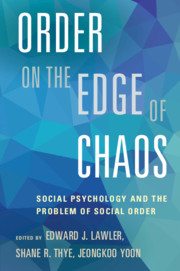Book contents
- Frontmatter
- Contents
- List of Contributors
- Preface
- 1 Social Psychology of Social Order: An Introduction
- 2 The Evolutionary Biology and Sociology of Social Order
- 3 Social Rationality and Weak Solidarity: A Coevolutionary Approach to Social Order
- 4 An Integrative Theory of Action: The Model of Frame Selection
- 5 The Center Cannot Hold: Networks, Echo Chambers, and Polarization
- 6 Social Exchange and Social Order: An Affect Theory Approach
- 7 Institutions, Trust, and Social Order
- 8 Identity Verifi cation and the Social Order
- 9 Identities, Roles, and Social Institutions: An Affect Control Account of Social Order
- 10 The Gender Frame and Social Order
- 11 Status, Power, and Social Order
- 12 Interaction Order: The Making of Social Facts
- 13 The Arts of Together: Social Coordination as Dyadic Achievement
- 14 Dignity as Moral Motivation: The Problem of Social Order Writ Small
- 15 The Legitimacy of Groups and the Mobilization of Resources
- Commentary: Contrasts and Complementarities
- Index
- References
14 - Dignity as Moral Motivation: The Problem of Social Order Writ Small
Published online by Cambridge University Press: 05 December 2015
- Frontmatter
- Contents
- List of Contributors
- Preface
- 1 Social Psychology of Social Order: An Introduction
- 2 The Evolutionary Biology and Sociology of Social Order
- 3 Social Rationality and Weak Solidarity: A Coevolutionary Approach to Social Order
- 4 An Integrative Theory of Action: The Model of Frame Selection
- 5 The Center Cannot Hold: Networks, Echo Chambers, and Polarization
- 6 Social Exchange and Social Order: An Affect Theory Approach
- 7 Institutions, Trust, and Social Order
- 8 Identity Verifi cation and the Social Order
- 9 Identities, Roles, and Social Institutions: An Affect Control Account of Social Order
- 10 The Gender Frame and Social Order
- 11 Status, Power, and Social Order
- 12 Interaction Order: The Making of Social Facts
- 13 The Arts of Together: Social Coordination as Dyadic Achievement
- 14 Dignity as Moral Motivation: The Problem of Social Order Writ Small
- 15 The Legitimacy of Groups and the Mobilization of Resources
- Commentary: Contrasts and Complementarities
- Index
- References
Summary
Abstract
How can we account for order while also recognizing agency and individuality? We propose dignity as a moral motivation for social personhood that represents a parsimonious theoretical – and ideally empirical – pivot for relating the agentic individual with social evaluations underlying the study of social order. A desire for dignity compels individuals to assert themselves socially while also contributing to the maintenance of social order. Because the bases of dignity are socially determined, an individual-level desire for dignity effectively serves to uphold social order. We draw on scholarship by Lamont, Goffman, Habermas, and others to identify a number of components, paradoxes and measurement issues relevant to the study of dignity as the locus of moralized individual selfhood. In closing, we cast the resurgent field of the sociology of morality as an ideal venue for advancing scholarship on human dignity.
INTRODUCTION
The study of morality is undergoing something of a resurgence in sociology (Abend 2014; Hitlin and Vaisey 2013), reinvigorating phenomena that were core to the founding of the discipline (Hodgkiss 2013; Powell 2010), instilling a focus on values, normative culture, and fundamental evaluative frameworks for understanding interaction and the social order. Morality ranges from the most personal inner experience up to the most macro-oriented forces that hold a cultural group or society together. It comprises intuitions, emotions, and thoughts that people share in defining proper, laudatory, and taboo thoughts, behaviors, and relationships (Haidt 2008). An actor's moral sense implicates the “socially defined systems of rules and roles” that give meaning to situations and actions (Kurtines 1984).
A modern sociological approach to morality, rather than attempting to establish or explain some single basis for morality across human societies, is anchored more firmly in groups, social position, and culture (Hitlin and Vaisey 2013). Within and across societal groups, subjective interpretations of ‘right’ and ‘good’ are experienced as externally binding, a priori axiomatic social forces (Joas 2000). Subjective moral experience derives from structural and cultural forces and maintains social order. Just as important variation exists regarding what is moral, so too does variation regarding what constitutes dignity in given situations, groups and societies (Hitlin and Piliavin 2004; Schwartz 2011). Similar to the idea of ‘thin’ versus ‘thick’ morality (Abend 2011), we believe dignity can be understood within particular situations as well as on a larger scale dealing with institutions, life courses, and ultimate ends.
- Type
- Chapter
- Information
- Order on the Edge of ChaosSocial Psychology and the Problem of Social Order, pp. 268 - 285Publisher: Cambridge University PressPrint publication year: 2015
References
- 8
- Cited by

